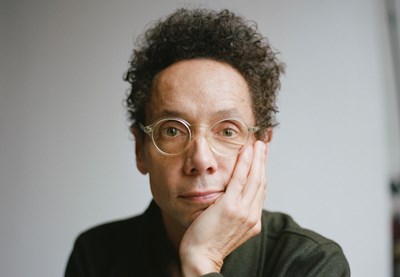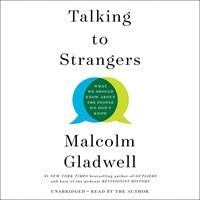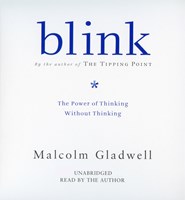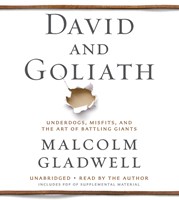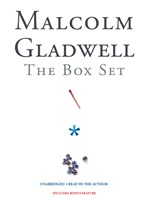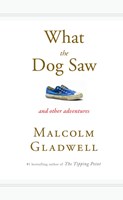Get our Newsletter
-
- Reviews
- Narrators
-
Features
- Audiobook ClubStart a conversation with your book club
- Best Audiobooks2023 Best Audiobooks
- ArticlesDiscover the diverse voices of audiobooks
- NarratorsSpotlight on popular narrators
- AuthorsAuthors talking about their audiobooks
- Upcoming TitlesFind upcoming audiobook release announcements
- Kids and TeensListening selections for kids & teens with age levels
- Audie Awards 2024 Audie Awards
- Subscribe
- About
- Articles
Podcasts
Talking with Malcolm Gladwell
2009 Best Voice in AUTHOR-READERS: Outliers, What the Dog Saw
In an interview with AUDIOFILE, author Malcolm Gladwell told us, “I do think audiobook listeners are having a different experience than readers of the text. In a certain sense they’re experiencing the book in a way much closer to the way I would like them to read it. When you read print, you can miss a lot of things that the author intends because you read it in your own idiosyncratic way. But I can really dictate the terms of the experience a lot more when I’m reading my book myself.” He bears out that authorial intention in narrations of his nonfiction works OUTLIERS and WHAT THE DOG SAW: “Gladwell reminds us that authors can effectively read their own books by turning in a well-crafted, subtle performance. His slightly husky upper-register voice is calm and assured, and he knows exactly where to pause, provide emphasis, and how to deliver a punch line.” -2009
AUDIOFILE spoke with Malcolm Gladwell the day after his new book, Blink, had cracked the top ten for audiobook sales—a feat for a nonprofessional narrator. Does Gladwell have a secret method for a successful author reading? Here’s what we uncovered from talking to the author of BLINK and THE TIPPING POINT.
Rule No. 1: Eat breakfast. “You never realize it until you’re in a totally silent booth that if you’re hungry, your stomach rumbles all the time,” says Gladwell. “I don’t ever eat breakfast, and so we had to do all kinds of strategies to defeat the stomach-rumbling sounds.”
Rule No. 2: Write the way you speak. “I’m very conscious of how my work sounds as I write it,” he explains. “I used to get in trouble in college during exams because I would be whispering under my breath as I wrote because it is a natural thing for me to talk it out loud as I write. It has to sound right to read right in my books. That makes for a more effective audiobook.”
Rule No. 3: Give the listener a unique experience. “I do think audiobook listeners are having a different experience than readers of the text. In a certain sense they’re experiencing the book in a way much closer to the way I would like them to read it. When you read print, you can miss a lot of things that the author intends because you read it in your own idiosyncratic way. But I can really dictate the terms of the experience a lot more when I’m reading my book myself.”
Rule No. 4: Listen to audiobooks. When Gladwell was asked to read an abridgment of his first book, THE TIPPING POINT, he did it because he assumed most were abridged. “I’d never heard an audiobook because I didn’t have a car. Then I got a car and started to listen to audiobooks and realized that you want to listen to the whole thing. So I was happy this time around [for BLINK] when we decided to do the whole thing.” What has Gladwell enjoyed listening to? “The thing about reading audiobooks,” he says, “is that your appreciation of the book is so tied up in where you listened to it and what you were doing. One summer I drove back and forth to my parents’ house in Canada. It was a ten-hour drive, and I remember one of my favorites was TITAN, the biography of the Rockefellers.”
Rule No. 5: Don’t do voices. “I bought the audiobook for THE DA VINCI CODE,” says Gladwell, “and the narrator assumed all the voices of the characters. Later, I thought when I was quoting Van Riper [Paul Van Riper, the retired Marine described in Blink who defeated the armed forces in simulated warfare in 2002], it would have been wonderful to capture his voice in some way. But I know I can’t do that. You have to be very skilled as an actor.” Though Gladwell does a wonderful job conveying the material in THE TIPPING POINT and BLINK, don’t expect him to join the ranks of professional narrators. “There’s a reason you hire actors,” he says. “Narration is very, very difficult. It’s exhausting and requires a level of technical skill.” And a good breakfast.—Richard Stim
JUN/ JUL 05 © AudioFile 2005, Portland, Maine
Photo © Brooke Williams
Photo by Celeste Sloman
The latest audiobook reviews, right in your inbox.
Get our FREE Newsletter and discover a world of audiobooks.


